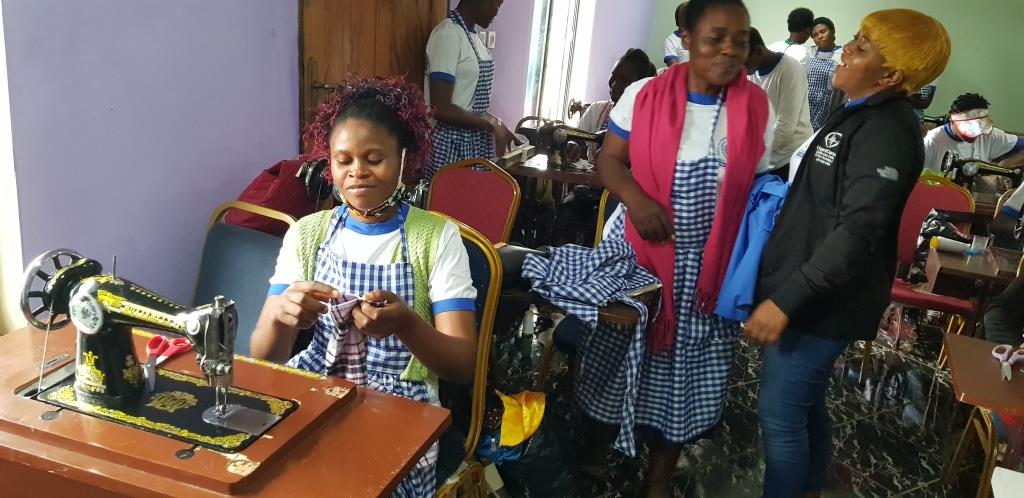By Patricia Brick
A BGR project with the Centre for Community Regeneration and Development (CCREAD-Cameroon) provides vocational training for marginalized women.
The Centre for Community Regeneration and Development (CCREAD-Cameroon) has worked since 2006 to support marginalized and disadvantaged women and girls through education, health, and community empowerment projects. CCREAD-Cameroon has been a BGR partner since 2017, when our first project together supported vocational training for impoverished widows, single mothers, and underemployed girls and youths in Mile 16 Bolifamba, a community in southwest Cameroon where 98 percent of residents are peasant farmers and more than 85 percent of households subsist on incomes below the U.N. poverty line. A survey completed in the year before our partnership began found that among this population of some 18,000 people, more than half of women are single mothers and/or widows; three in five of these women’s children have not completed even a single year of school due to poverty.
By providing vocational training for marginalized women in communities like Mile 16 Bolifamba, CCREAD-Cameroon gives them the opportunity to find work that will allow them to pay for food, housing, medical care, education, and other basic needs for themselves and their children.
Since the first year of our partnership, CCREAD-Cameroon has provided coursework in hairdressing or in sewing, tailoring, and clothing design to hundreds of trainees, who are primarily single mothers, teenage mothers, widows, women with disabilities, and young women and youths who have had to drop out of school because of poverty. Upon completion of the program, the graduates receive seed capital and mentoring to help them start their own small businesses.
Over the years, the program expanded to three locations in the area, and in 2019, BGR funding supported the construction of a permanent home for CCREAD-Cameroon’s vocational training center in the nearby city of Buea. In the center’s first year, our partner trained 217 women and provided education and support for 100 children and youths in need. By the end of 2020, some 450 women, youths, and girls will have completed training at the center, and more than 150 vulnerable children will have received services there.
Mrs. Celine Ngang is a graduate from the tailoring program at CCREAD-Cameroon’s permanent training center. “To me, this place is teaching us how to catch fish, and not giving us fish,” she said, making reference to a proverb that speaks to the value of providing people in need with lifelong skills rather than simply offering temporary aid.
Many women who participate in CCREAD-Cameroon’s vocational training have had no other formal education. Coursework at the center therefore includes basic literacy and writing education, giving the women the opportunity to share their stories.

Mrs. Kang Mary supports three children alone after the death of her husband some years ago. After completing training in August 2019, she said, “I never knew that one day I would be able to work and earn my own money and stop depending on people for help.” She expressed joy in knowing that her children’s future is now secure.
Another woman, a single mother of two children who has trained in hairdressing at CCREAD-Cameroon’s vocational center, said: “When I got pregnant out of rape and the man ran away, my family turned their backs on me. I had no one to run to. I was directed to CCREAD-Cameroon, where I have received free training in hairdressing sponsored by BGR. I have now regained confidence and integrity, and my two children and I now have hopes for a brighter future.”
Mrs. Ntui Nancy, a single mother, came to CCREAD-Cameroon to ask for money for her son’s education. She said that she received that and more: “They started paying the fees of my poor son and offered me free vocational education. I can only say thank you and wish that many of my sisters going through the same conditions would be given the same opportunities to have hopes again.”
In 2020, BGR funding, along with funding from our European sister organization MiA, is supporting the installation of a solar-energy system to provide low-cost electricity for the permanent center and the construction of a natural borehole to generate free, potable water for the women, youths, and children attending activities at the center. The project also funds training materials for the center’s activities this year. Our partner expects that these changes will allow CCREAD-Cameroon to enroll and train 100 additional women each year.
This article is based on project summaries provided by CCREAD-Cameroon.
Images courtesy of CCREAD-Cameroon.


